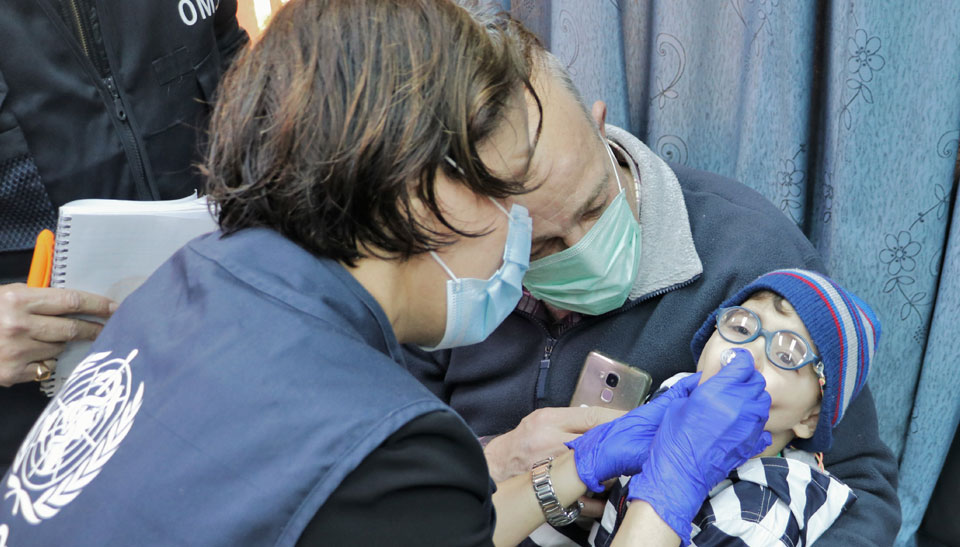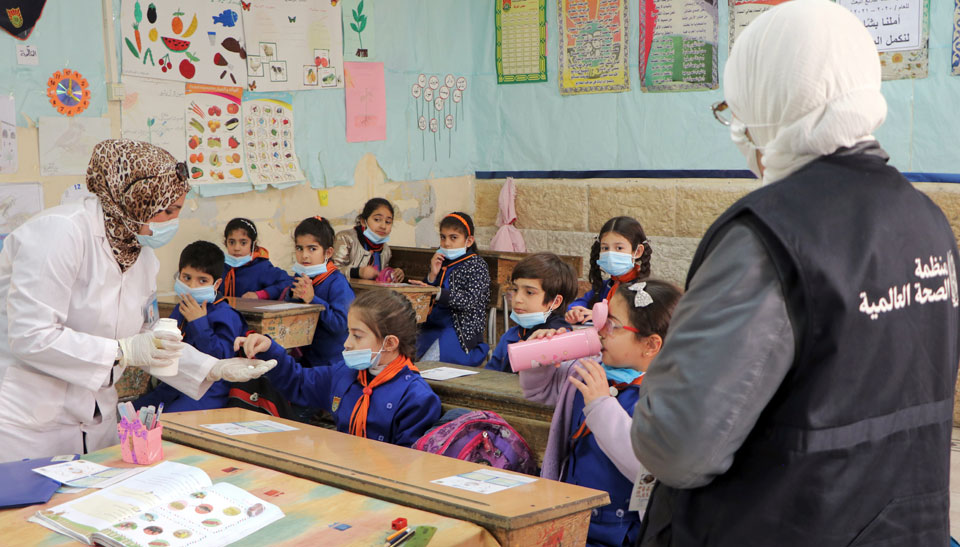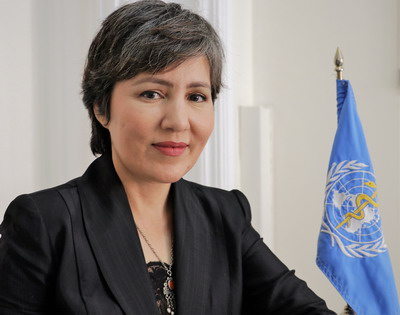WHO in Syria capacitates community workers to launch a campaign on psychosocial support to parents and caregivers in the context of COVID-19

18 April 2021 - In Syria, approximately one in 10 people is expected to be living with a mild to moderate mental health condition, while 1 in 30 is likely to suffer from a more severe condition. Prolonged exposure to conflict increased the prevalence of mental health conditions. COVID-19 has added more strain to the mental wellbeing of families in Syria. In 2020 only, WHO provided over 220 thousand mental health consultations and services through integrated community-based services – either through mobile clinics or through family wellbeing centres across the country.
In 2020, WHO Syria, as a member of the Inter-Agency Standing Committee Reference Group on Mental Health and Psychosocial Support in Emergency Settings (IASC MHPSS RG), supported the development of “My Hero is You”, a story telling book for children. The project was supported by global, regional and country based experts from member agencies of the IASC MHPSS RG, in addition to parents, caregivers, teachers and children in 104 countries. The book was designed to support children and parents who had anxieties and fears associated with COVID-19. In a short time, “My Hero is You” gained so much popularity, that it was translated into many languages of the world, including Arabic.
WHO Syria’s Mental Health team went further to adapt the book as a colouring book. The team believed in the healing power of innovative and interactive interventions, such as arts, on children and on families. The Syrian adaptation in English and Arabic are now available for the global audience on the IASC website.
To make the colouring book available to children and families in Syria who in its majority do not have access to online resources in rural places, WHO Syria printed out the publication in the framework of the Regional Solidarity Initiative and plans to distribute them in two pilot districts in Rural Damascus. Through 10 outreach teams of community workers from two NGOs, mainly, Inaash Al-Fakeer Association and Al-Qutayfah Association, WHO Syria plans to reach communities – parents, caregivers and children. The NGOs will not only distribute the colouring book and crayons to children, but will also provide psycho-social support sessions to parents and caregivers and teach them how to talk to children who have fears.
NGOs, with the support of the Ministry of Health, Ministry of Social Affairs and Labour, and WHO will implement the campaign to deliver mental health and psycho-social support messages about how to cope with stress and how to enhance wellbeing for oneself and others. The campaign will also provide direct services with a special focus on combating the dual social stigma related to mental health and COVID-19 response.
Prior to the campaign launch, from 4 to 15 April 2021, NGO outreach teams of about 80 volunteers underwent training by WHO on COVID-19 response focusing on risk communication and community engagement (RCCE), infection prevention and control (IPC), mental health and psycho-social support (MHPSS), as well as basic psycho-social skills for COVID-19 responders as mandated by the updated version of WHO Clinical Management Guideline.
“As adults, we sometimes forget how hard it is being a child. When we see an adolescent, who has difficulties at school, we may think he does not put extra efforts to study, or it is natural for adolescents to behave this way. But what we do not realize oftentimes is that the child may be going through a mental health crisis. We need to help those children to overcome the stress and we can start by simply asking “How can I help you?”. It is a powerful question indeed to start the conversation and listen to the child,” said Latif, 30-year-old primary teacher who participated at the training.
Another participant, twenty-nine-year-old Majdi from Rural Damascus said, “This training has taught me to pose the question as “How can I help?” as opposed to “What’s wrong with you?”
“Mental health remains one of the most neglected areas of public health. This training provides me with a lot of essential information to help children to cope with their fears in the context of COVID-19” said Hwazen (30 years old, doctor) one of the participants.
Many Syrian adults report that their and their children’s well-being and future potential constitute the greatest source of stress. In addition, the COVID-19 pandemic has added to their already shattered mental health.
“People of Syria share how the war dramatically affected their lives and psychological wellbeing. Thus, mental health services are key to building resilience and positive coping strategies for children, adolescents and adults,” said Dr Akjemal Magtymova, Head of Mission and WHO Representative in Syria.
Now, that the community volunteers are empowered and capacitated, they will launch the campaign using “My Hero is You” colouring book and reaching around five thousand children, hundreds of parents and caregivers and school health educators in the Rural Damascus governorate. Awareness raising sessions on COVID-19 prevention measures and coping with stress strategies will be part of the campaign, as well as focus group discussions with parents and caregivers and dedicated sessions with children, all of which will lead to empowering communities in Syria and strengthening their resilience and mental health.
Related link
Keeping Syria polio-free requires sustained commitment

9 April 2021 - Amidst a decade-long conflict, economic crisis and political upheaval, WHO continues to support strengthening public health programmes and implementation of immunization activities, national polio vaccination campaigns and surveillance for acute flaccid paralysis.
In the middle of March 2021, a national polio immunization campaign concluded, reaching 2.5 million children under the age of five in all 14 governorates of Syria, including high-risk areas of the eastern Euphrates, refugee and IDP camps, and nomadic areas.
“Since Syria is close to countries that are at high risk of polio outbreaks, it is very important to maintain a high immunity barrier for children of age 0–59 months against polio,” said Dr Akjemal Magtymova, WHO Representative to the Syrian Arab Republic. “Last year, we didn’t have any outbreaks of polio or other vaccine-preventable diseases, so this campaign is crucial to sustain the momentum gained.”
Over 10 000 trained health workers and supervisors were mobilized during the campaign, working at the local and governorate level. WHO provided logistical support to ensure the smooth implementation of the campaign. This meant everything from facilitating refresher training for health workers and supervisors, to delivering the vaccines across Syria and transporting mobile vaccination teams and supervisors to just about every part of the country.
As has become standard with mass vaccination activities, COVID-19 preventive measures were strictly followed during the campaign, including physical distancing and the use of gloves, sanitizer, masks and other equipment. With the financial support of Gavi, the Vaccine Alliance, WHO provided personal protective equipment to all vaccinators working through Syria’s Expanded Programme on Immunization (EPI).
Syria has seen a drop in vaccination coverage for multiple antigens over recent years due to the sharp reduction in trained health workers and technical experts and the widespread destruction of infrastructure, including vaccination centres. Raising the immunity level to all vaccine-preventable diseases is a priority, but also a challenge.
Last year, Syria conducted two full national immunization campaigns and one subnational polio campaign.
“Insecurity in Syria is a serious impediment to reaching targeted children with polio vaccine. However, we have managed to reach and vaccinate children to prevent polio re-occurrence in Syria, especially at these times of COVID-19, where there is a risk of under-immunized children,” said Dr Magtymova.
|
Date of polio campaign (OPV) |
Targeted U5 children |
U5 vaccinated |
Reported coverage |
Post-campaign monitoring |
|
16–20 February 2020 |
2 804 279 |
2 652 471 |
95% |
89% |
|
19–23 July 2020 |
948 381 |
972 984 |
102.6% |
89% |
|
11–15 October 2020 |
2 804 279 |
2 553 658 |
91.1% |
92% |
WHO-supported deworming campaign reaches millions of children in Syria

Reflection of Michael Atieh, WHO Syrian Arab Republic country office staff member
8 April 2021 - Children go running around playing with each other daily without a worry in mind. They play in the sand, dirt, mud and wherever else their imaginative young minds take them. However, consequences arise when improper sanitation is part of a child’s daily routine. Since these children are young and may not be attentive, they become the most likely victims of intestinal worms. These intestinal worms are transmitted by worm’s eggs present in human faeces, which in turn contaminate soil in areas where sanitation is poor. Consequently, we see intestinal worms affect severely impoverished and hygiene-deprived communities.
Intestinal worms can come in many different shapes and sizes and most commonly cause nausea, fatigue, restlessness, abdominal pain, and weight loss. As a result, if not treated immediately, it can have a devastating effect on a child’s future. Long-term consequences of intestinal worms include cognitive disabilities, anaemia, and growth impairment.
After 10 years of conflict, Syria has become a fertile land for intestinal worms to thrive. Poor sanitation has become the norm in many areas throughout the country, mainly due to either lack of proper water and sanitation infrastructure or lack of education on hygiene.
During the past five years, to fulfil its mandate to provide health services to all people in need, WHO, in close collaboration with the Ministry of Health and the Ministry of Education, has supported four soil-transmitted helminths deworming campaigns in Syria. This year’s four-week deworming campaign took place in March targeting 3 036 000 school children from all governorates.
The campaign revealed that the key concern for schools is water distribution. Since there is no clean water, the students cannot properly wash their hands after playing outside, thus creating a higher probability for transmission. The deworming medication provided to schoolchildren was very helpful. However other external factors causing the transmission of worms need to be further addressed.
WHO has played a vital role in eradicating intestinal worms. For over 70 years, thanks to WHO, numerous campaigns have been launched and several committees have been formed tackle to the issue. As a result, in 2001, WHO announced that 75% of school children in endemic areas were receiving deworming treatment. However, worms have not been completely eradicated, as they still affect over 2 billion people worldwide. The work preventing intestinal worms needs to continue.
World Health Day address by WHO Representative to Syria
 WHO Representative Dr Akjemal Magtymova7 April 2021 – The COVID-19 pandemic has devastated us all. However, the harshest impact has been on people already experiencing inequities because of poverty, gender, ethnicity, education, occupation, migrant status, disability, and discrimination. In conflict-hit Syria, people are disproportionately vulnerable to exposure to the disease in the context of fragile health systems, they lack access to health services and are heavily impacted by economic consequences of the pandemic. Access to COVID-19 vaccines to reduce ongoing transmission is yet another mammoth task for Syria.
WHO Representative Dr Akjemal Magtymova7 April 2021 – The COVID-19 pandemic has devastated us all. However, the harshest impact has been on people already experiencing inequities because of poverty, gender, ethnicity, education, occupation, migrant status, disability, and discrimination. In conflict-hit Syria, people are disproportionately vulnerable to exposure to the disease in the context of fragile health systems, they lack access to health services and are heavily impacted by economic consequences of the pandemic. Access to COVID-19 vaccines to reduce ongoing transmission is yet another mammoth task for Syria.
COVID-19 is not the only health issue that gravely affects people in Syria, 12.4 million of whom need health aid. The efforts of the World Health Organization (WHO) through its country presence are specifically focused to protect, promote and improve health for all people in Syria by addressing inequalities.
Syria is part of the WHO’s Eastern Mediterranean Region, where most of the global causalities from health emergencies occur.
In addition to fatalities, the conflict in Syria continues to cause high rates of disability, communicable and noncommunicable diseases and mental health disorders. Peace is a prerequisite for health, in the absence of which the existing inequities are exacerbated, adversely affecting all aspects of the social determinants of health, including basic human rights, availability of health services, education, employment, income, social protection, shelter, water and sanitation. Furthermore, inequalities are closely interlinked with migration and the weak governance systems.
WHO uses a health systems approach to deliver health services. The essential building blocks of the health system include health infrastructure, health workforce, medicines and supplies, health information, health financing and governance. While governance, systems, institutions and society are the key for self-reliance and resilience, the humanitarian-development nexus and institution-building are conditional to peace processes and a political solution.
To save lives, Syria needs a functional health system and to focus on 4 priority areas.
First, the capacity for public health surveillance and detection is limited.
This requires strengthening the surveillance systems for emerging and remerging threats, as well as laboratory capacities to effectively provide epidemiological evidence, generate predictions and manage risk, especially in the current context.
Second, Syria needs functioning health facilities so that people can go to health facilities for care and treatment. The destruction caused to health infrastructure over a decade of conflict is enormous, hospitals being affected the most with only half fully functioning. Some governorates and populations are being affected most. For example, in northeast Syria, out of 16 public hospitals, only 1 is fully functioning and 3 are partially functioning. It is a massive challenge to ensure the adequate number of hospital beds in intensive care units, in the wake of the third wave of COVID-19 in Syria.
Third, health workers are the backbone of the health system. With only half of the health care workforce remaining in the country, medical personnel struggle to cope with the overwhelming health needs. We need to invest in the health workforce.
Fourth, it is important to ensure adequate supplies of essential medicines for a minimum of 60 days as part of the national stockpile. Economic impact has affected the hike in the cost of locally produced medicines, making it unaffordable for people and unprofitable for producers, thus limiting access to medicines to millions of people in Syria in these critical times.
To build back a fairer and healthier future for people of Syria, our collective efforts should prioritize the social determinants of health, equity in health and dignified lives. We must also highlight and mitigate the negative impacts of sanctions on health. We should reduce social inequities, protect human rights, improve gender equality and build resilient communities.
WHO’s vision is to achieve Health for All. As we mark World Health Day, together with partners, we strive to create conditions that allow people to fulfil their health potential and to overcome barriers that prevent women, men and children from accessing quality health services and ensure that those services are available everywhere and to everyone. Our highest priority now is to ensure equitable access to COVID-19 vaccines to protect health and frontline workers and to combat the pandemic.


